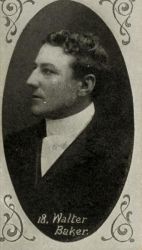Wife Accuses Stage Hero of Sleeping with all the Damsels: Read All About It!
Leann Richards reports on how the whiff of backstage shenanigan’s made the front page in 1901, when actors used their skills in a courtroom drama of love and jealousy.
In the late 19th and early 20th centuries, melodrama was one of the most popular forms of entertainment. Tales of dastardly villains corrupting beautiful maidens and deceiving handsome heroes thrilled audiences across the world. One of the main exponents of this art was Bland Holt, whose dramatic plays and realistic scenic effects produced many heart racing moments for Australian audiences.
Bland Holt's company consisted of some of the most celebrated and experienced melodramatic actors of the time. Holt and his wife, Florence, were accomplished comedians who handled all the comic parts of his plays. Of course the company was not complete without the stock heroine, the villain and the hero. Arthur Styan usually played the moustache-twirling villain, whose evil schemes were foiled at the last moment by the handsome hero. Arthur's evil on stage persona was a dramatic contrast to his priest-like off stage personality. The handsome Walter Baker, with his chiseled good looks and wide eyes, was the perfect hero. His loyal and courageous on stage actions were very different to his real life womanising ways. Finally, every good play had a beautiful heroine, and Holt's usual heroine was the talented and charming Frances Ross. Her perilous on-stage sufferings kept pulses racing and hearts aflutter whilst her off stage adventures were equally exciting. Every melodrama had a happy ending, and Holt's usually concluded with Walter and Frances in an on stage embrace. A romantic climax, which brought cheers and tears to audiences.
 In March and April 1901 Bland Holt's company was playing at the Theatre Royal in Melbourne. Walter and Frances had just finished roles in In Sight of St Pauls, which had concluded with Walter as 'Tom Chichester' saving Frances from a burning house. Frances then starred in another drama called The World, which had explosions, murder, a robbery and an attempt to disgrace the noble heroine. In short, typical melodramatic fare.
In March and April 1901 Bland Holt's company was playing at the Theatre Royal in Melbourne. Walter and Frances had just finished roles in In Sight of St Pauls, which had concluded with Walter as 'Tom Chichester' saving Frances from a burning house. Frances then starred in another drama called The World, which had explosions, murder, a robbery and an attempt to disgrace the noble heroine. In short, typical melodramatic fare.
The on-stage drama, however, was no match for the off-stage action in April 1901.
One night the windows of Frances' home in East Melbourne were broken by a rude vandal. Walter, being a polite gentleman, and concerned with his heroine's welfare, had begun to walk her home after the theatre. He also spent a great deal of time at her house protecting her from harm.
On the night of Saturday April 20th, a strange woman, dressed as a girl of 16, in a short frock with yellow hair hanging down her back, lurked outside the stage door of the Theatre Royal. As Frances and her maid Blanche Wilson exited the theatre on Little Bourke Street, the woman aggressively approached them. Harsh words were exchanged between the three ladies and the strange woman lunged towards Frances and threw something vile at her. The two women struggled, with Frances grabbing the woman's collar. The woman then raised a horsewhip and struck Frances fiercely with it.
 Bland Holt's heroine fell to the ground, Blanche screamed for help and the assailant ran from the scene. Assistance soon arrived and Frances was carried gently home to East Melbourne.
Bland Holt's heroine fell to the ground, Blanche screamed for help and the assailant ran from the scene. Assistance soon arrived and Frances was carried gently home to East Melbourne.
The next morning Blanche, accompanied by her solicitor, swore a complaint at the city court identifying the assailant as Carlotta Saddler.
Carlotta was the wife of Bland Holt's hero, Walter Baker, whose real name was Alfred Saddler. The pair had a tempestuous relationship marked by jealousy and possessiveness on both sides. Carlotta was convinced that Walter had been intimate with all his leading ladies and was obsessed with his relationship with Frances, who had been acting with him for 6 years.
Walter's frequent visits to Frances' home and his solicitous regard for her safety, combined with the nightly on-stage embraces and loving words, had infuriated Carlotta. She firmly believed that Frances had separated her from her husband. The assault was the latest in a series of incidents between the two women.
The violent encounter outside the theatre caused great excitement in the theatrical community and the newspapers gleefully reported the details. The court case was eagerly awaited.
On April 29th, Walter, Frances and Carlotta appeared at the city court. The scene that followed showed all the characteristics of a great melodrama.
Frances played the part of the innocent heroine, demurely denying charges of intimacy with Walter and stoically describing the unprovoked attack by the evil Carlotta. At the climax of her testimony, she reluctantly lifted the veil, which had been covering her face to dramatically reveal the bruise left on her forehead by the dastardly assault. The horsewhip responsible was flourished by the prosecution to reinforce the horror of the attack.
Walter, ever the hero, also testified. He played the part of the plagued and harassed husband to perfection. Walter described his marriage as 'unhappy' and explained how his wife repeatedly and falsely accused him of infidelity with his leading ladies. Walter also told the court that he had paid for Frances' broken windows, because he felt 'morally responsible' for his wife, who had perpetrated the deed. Walter's handsome face and charm made him a compelling prosecution witness.
 Finally the villainess of the piece appeared on the court stage. Carlotta testified that Frances was responsible for the faults in her marriage; she accused the actress of intimacy with all her leading men. Carlotta asserted that she had only acted in self-defence. The prosecutor tore her to pieces, forcing her to admit hitting Frances.
Finally the villainess of the piece appeared on the court stage. Carlotta testified that Frances was responsible for the faults in her marriage; she accused the actress of intimacy with all her leading men. Carlotta asserted that she had only acted in self-defence. The prosecutor tore her to pieces, forcing her to admit hitting Frances.
Carlotta did not have a chance against two accomplished actors and a court which followed the trends of fashion. She was fined £5 and placed on a £25 good behaviour bond for 12 months.
Walter and Frances continued to act together for Bland Holt and their nightly appearances on stage must have infuriated Carlotta. However, the fiery marriage continued and Walter and Carlotta continued their domestic disputes. Four years later, Walter jealously approached his wife and another man on a Melbourne Street. The man produced a gun and fired at Walter, fortunately missing him. This time Walter accused his wife of infidelity and another scandalous court case ensued. The relationship seemed destined to be as melodramatic as the plays in which Walter acted and perhaps that was the motivation for his nightly heroics on Bland Holt's stages.
Images - Publicity postcard from the Bland Holt production of The Great Rescue and period cigarette cards. (Courtesy - Neil Litchfield)
To read more stories by Leann Richards, visit HAT - History of Australian Theatre - www.hat-archive.com/index.html
Visit Leann's blog www.hat-archive.blogspot.com/

